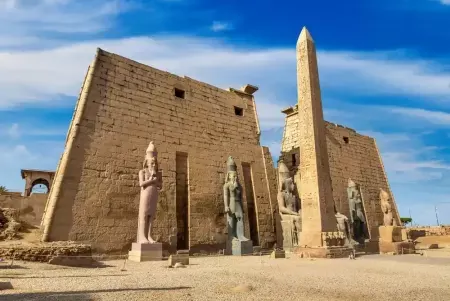The Library of Alexandria, situated in the ancient city of Alexandria, Egypt, was one of the most remarkable institutions of the ancient world. Unveiling the Mysteries of the Library of Alexandria.
Introduction to the Library of Alexandria
The Library of Alexandria, situated in the ancient city of Alexandria, Egypt, was one of the most remarkable institutions of the ancient world. Founded in the 3rd century BCE, this grand library became a beacon of knowledge and a symbol of intellectual enlightenment.
It served as a gathering place for scholars, housing a vast collection of scrolls and manuscripts from various civilizations. The Library of Alexandria was not only a physical space for storing books, but also a center of academic learning and research. It was a place where scholars from all over the world would convene to exchange ideas, debate philosophies, and unravel the mysteries of the universe.
The History and Significance of the Library of Alexandria
The Library of Alexandria was established during the reign of Ptolemy I, one of the successors of Alexander the Great. Ptolemy I envisioned the library as a means to consolidate knowledge from across the known world and to showcase the intellectual prowess of Alexandria. Under his patronage, the library flourished and grew in reputation. It became a magnet for scholars, who flocked to the library in search of wisdom and enlightenment.
The significance of the Library of Alexandria cannot be overstated. It was not merely a storage facility for books, but a symbol of the intellectual achievements of ancient civilizations. The vast collection of scrolls and manuscripts housed within its walls represented the collective knowledge of humanity up to that point in history. It was a testament to the power of human curiosity and the pursuit of knowledge.
The Architecture and Organization of the Library of Alexandria
The architecture of the Library of Alexandria was as awe-inspiring as its purpose. The main building, known as the "Mouseion," or "Temple of the Muses," was a magnificent structure that housed the majority of the library's collection. It was adorned with statues, artwork, and inscriptions that celebrated the achievements of scholars and thinkers.
The organization of the library was meticulous and efficient. The scrolls and manuscripts were cataloged and arranged according to subject matter, making it easy for scholars to locate specific texts. The librarians, known as "sophronistai," were responsible for maintaining and preserving the collection. They were highly respected individuals who dedicated their lives to the pursuit of knowledge and the preservation of ancient texts.
The Collection of the Library of Alexandria
The collection of the Library of Alexandria was unparalleled in its breadth and depth. It housed texts from various civilizations, including the Greeks, Egyptians, Persians, and Babylonians. The library aimed to collect and preserve every known text from around the world, making it a true repository of human knowledge.
The collection included works of literature, philosophy, mathematics, astronomy, medicine, and many other disciplines. It was a treasure trove of information, providing scholars with access to a vast array of ideas and theories. The library also employed scribes who would copy important texts to ensure their preservation and dissemination.
The Scholars and Thinkers of the Library of Alexandria
The Library of Alexandria attracted some of the greatest minds of the ancient world. Scholars and thinkers from all corners of the known world would journey to Alexandria to study, teach, and engage in intellectual discourse. It was a melting pot of ideas and philosophies, where different cultures and traditions intermingled.
Prominent scholars, such as Euclid, the father of geometry, and Eratosthenes, the mathematician who accurately calculated the Earth's circumference, were associated with the library. These individuals pushed the boundaries of knowledge and made significant contributions to their respective fields.

Is the Library of Alexandria the biggest library in the world?
No, the Library of Alexandria is not the biggest library in the world but it is one of the biggest. While it was certainly a renowned library in its time, it was eventually destroyed and lost.
The Library of Alexandria has historical significance, it is not the biggest library in the world today. The development of libraries over time has led to the establishment of larger and more extensive collections in various countries around the globe.
What books were lost in Alexandria?
Throughout its existence, the library, unfortunately, encountered various obstacles, such as fires, conflicts, and political turmoil. Regrettably, these circumstances ultimately resulted in the gradual deterioration and disappearance of a significant number of its invaluable texts. As history tells us, an immense quantity of books were lost at the Alexandria library.
It is said that around forty thousand books were burned during this tragic event. Furthermore, there is a distinct accusation that Caesar resorted to using fire as a means to fend off the impending danger, which unfortunately spread from the dockyards and brought about the destruction of this magnificent library.
Many ancient writings, including those of Hipparchus, often referred to as "the father of astronomy," have unfortunately been lost. Fortunately, we have some knowledge about these writings thanks to the account given by C. Ptolemy, who lived three centuries later.
It is highly likely that there were also some lost works of Aristotle. Additionally, other valuable texts that potentially fell victim to the destruction of the Library of Alexandria include the Cyclic Epics, which specifically dealt with the Trojan War. Regrettably, only fragments of these epics remain today.

Who destroyed Alexandria famous library
The destruction of the Alexandria library is a subject of much debate and controversy. While there is no definitive answer as to who exactly was responsible for its destruction, there are several theories and historical accounts that shed light on this tragic event.
One of the most popular theories suggests that the library was destroyed during the Roman conquest of Egypt in 30 BCE. According to this theory, the library was caught in the crossfire between Julius Caesar's forces and those of the Egyptian ruler Cleopatra. It is believed that during the conflict, the library was accidentally set on fire and suffered significant damage.
Another theory attributes the destruction to the Muslim conquest of Egypt in the 7th century CE. According to this theory, the Caliph Omar, upon hearing about the vast collection of books in the library, is said to have ordered its destruction, as he believed that if the books contained information that was not in accordance with the Quran, they were unnecessary and should be destroyed.
However, it is important to note that these theories are based on historical accounts and there is no concrete evidence to definitively prove who destroyed the Alexandria library. The lack of concrete evidence has led some scholars to argue that the destruction of the library was gradual and not a result of a single catastrophic event.
Regardless of who was responsible, the destruction of the Alexandria library was an immense loss to human knowledge and history. The library was known to house a vast collection of books, manuscripts, and scrolls from different civilizations, making it a center of learning and intellectual exchange.
The Legacy of the Library of Alexandria
Despite its destruction, the legacy of the Library of Alexandria lives on. The library served as an inspiration for future generations of scholars and thinkers. Its reputation as a center of intellectual excellence has endured throughout the ages.
The loss of the library's collection also highlighted the importance of preserving and disseminating knowledge. It served as a cautionary tale, reminding us of the fragility of human achievements and the need to protect our intellectual heritage.
The Ongoing Search for Remnants of the Library of Alexandria
Though the physical library may be lost to history, there is an ongoing search for remnants of the Library of Alexandria. Archaeologists and historians continue to excavate the ancient city of Alexandria in the hopes of uncovering clues about the library's existence.
In recent years, several significant discoveries have been made, including a possible site of the library's annex and a collection of ancient texts known as the "Bibliotheca Alexandrina." These findings offer glimpses into the grandeur and significance of the original library.
Fictional Depictions of the Library of Alexandria in Literature and Film
The Library of Alexandria has captured the imagination of writers and filmmakers throughout history. It has been the subject of numerous fictional works, each offering its own interpretation of the library's mysteries and significance.
One of the most notable fictional depictions of the library is in the novel "The Name of the Rose" by Umberto Eco. In this gripping tale, the library serves as the backdrop for a murder mystery, highlighting the power and allure of forbidden knowledge.
Conclusion: The Enduring Mystery and Importance of the Library of Alexandria
The Library of Alexandria continues to captivate us with its enduring mystery and importance. It represents a time when knowledge was cherished and celebrated, and when scholars from different cultures came together to push the boundaries of human understanding.
Though the physical library may be lost, its legacy lives on in the pursuit of knowledge and the preservation of our intellectual heritage. As we continue to uncover the mysteries of the past, we are reminded of the power of ideas and the enduring quest for enlightenment.
Join us on a journey through history and explore the wonders of ancient knowledge. Discover more about the Library of Alexandria and the enduring legacy it left behind. Let us uncover the mysteries together.
.webp)
.jpg)
.webp)






